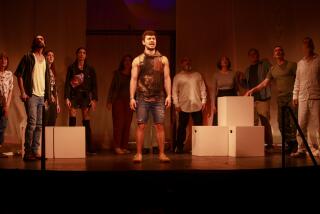THEATER : A Short, Frank AIDS Play for Students
- Share via
In one sense, “His Brother’s Keeper” appears to be a very modest effort. It’s only 15 minutes long, has a cast of three and is staged without a single prop.
But the subject--AIDS--is so devastating that embellishment is hardly needed. In fact, as it’s being presented locally by Stop-Gap, the starkness of mood, spareness of dialogue and underscoring of factual detail all add to the impact.
Stop-Gap, a drama therapy troupe based in Santa Ana, is presenting the original piece to high school and college students.
“They’re the age group that’s the most vulnerable to AIDS, the one that needs most to know what AIDS is and isn’t, what it can do both physically and socially,” said Don Laffoon, Stop-Gap’s executive director.
“His Brother’s Keeper,” written by Stop-Gap actor Robert Knapp, is about one AIDS victim, a high-school student named Paul. The story takes place shortly after Paul’s death at age 16. His mother and older brother, Neil, are staggered by Paul’s death, which came so swiftly and amid such bewilderment.
Like other Stop-Gap productions, “His Brother’s Keeper” is meant to present frank but not graphic explanations and to generate classroom discussions about the problem and its prevention.
“His Brother’s Keeper” offers only vague hints about how Paul may have contracted AIDS. Perhaps from a blood transfusion he had after a hiking accident? Perhaps from a drug connection (his mother recalls finding pills in his room)?
There are the explanations by Paul’s doctor that AIDS can be contracted from exchange of semen or blood--including from the sharing of hypodermic needles--but not from hugging, from mosquito bites or from touching someone’s clothing.
Mostly, the mood is still one of overwhelming lack of knowledge, a terrifying sense of helplessness.
Near the playlet’s end, the doctor says he can give little comfort when the dying Paul asks about methods for extending the lives of victims or finding a possible cure. “I had to tell him,” recalls the doctor, “I didn’t know.”
The usual forms of AIDS education are booklets, films, class discussions and community forums. But Stop-Gap’s “His Brother’s Keeper” is the only theatrical form now being offered in Orange County.
This isn’t Stop-Gap’s first educational playlet on a highly controversial societal problem. It already has made the rounds of senior and junior high schools with “Under Pressure,” about drug abuse, and “When No Means No,” about date rape.
Unlike the two other projects, the AIDS playlet has yet to raise the $28,000 needed for a “full tour” of 60 senior and junior high schools.
“Usually, we try to get enough (fiscal) backing before we even start a tour. But the need for this play is so urgent, we did it on speculation--the play was written first, in the hopes that the money will follow,” said Laffoon.
So far, Stop-Gap has raised $11,500 of its goal--$4,000 from its recent benefit run of the John Weston play “Listen to the Dreaming” and about $7,500 from a grant it has just won from National Education Corp. of Irvine.
Stop-Gap has, however, won countywide praise for “His Brother’s Keeper,” which has been presented only three times--in September at the Arts on the Green festival and this month at Golden West and Rancho Santiago colleges.
Ann Becker, principal at Laguna Beach’s Thurston Middle School, plans to bring “His Brother’s Keeper” to her school in December. “We’re hoping all 400 of our students see it. It is absolutely vital that all families understand the nature and extent of AIDS. Put simply, it’s a life or death situation.”
At the Golden West College session last week, Marilyn Dixon, the college’s student health services director, told the audience of 60 students:
“There’s a terrible irony here. When other people die, the community gathers around the family. But not with AIDS. In these cases, people turn their backs on these families. They want nothing to do with them.”
As for the students in the audience, the impact seemed a universal one.
“It’s very moving and powerful,” one student said after seeing “His Brother’s Keeper.” “You can’t learn (about AIDS) just from circulars or from films. This hits you on the more emotional level. It’s more personalized, it’s more gut level.”
More to Read
The biggest entertainment stories
Get our big stories about Hollywood, film, television, music, arts, culture and more right in your inbox as soon as they publish.
You may occasionally receive promotional content from the Los Angeles Times.










